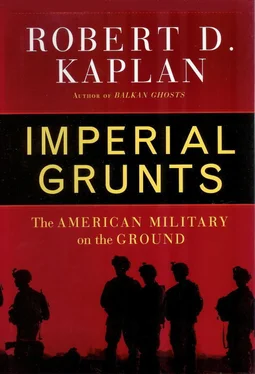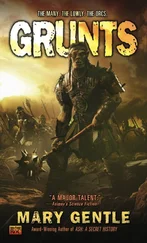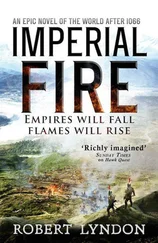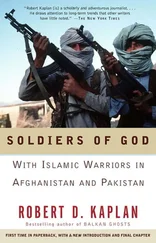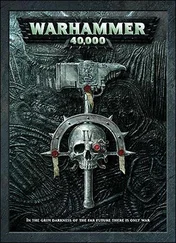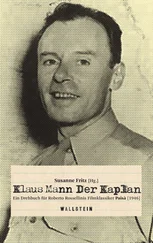“I’m ready to roast your communications minister alive,” Adolph complained. “I need to set up a radio call network for my staff in case of emergency and he won’t see me.” Ali Muhsen suggested he would settle Adolph’s problem. Adolph didn’t believe him, and went on complaining for a while. Ali Muhsen appeared to respect him for that.
Adolph introduced me in flattering terms and I made small talk with the general. To ask a direct question—or to consider this an interview—would have been an abuse of hospitality. In a place like Yemen the truth emerges by accident, when talking of other matters. The fact that the general had received me would serve as the best form of protection were I unlucky enough to be kidnapped. The excess of nervous-looking armed guards in the sitting room and nearby courtyard testified both to Ali Muhsen’s real authority and to the anarchy swirling around it.
———
Less than seventy-two hours after I had arrived in Yemen, during the most important holiday of the Muslim year, when government offices were closed, Adolph, with his passable Arabic, had arranged a trip for me through an area where westerners had been denied the right to travel, and had gotten me a brief audience with the country’s most shadowy figure. Adolph impressed me as neat, orderly, a bit anal-retentive even, as well as unpretentious.
Robert B. Adolph Jr. was born in 1952 in Chelsea, Massachusetts, one of nine children in a poor Catholic family. He started working when he was eleven. He was thrown out of high school five times, finishing 313 in a class of 330. He joined the U.S. Army after high school and was sent to Germany, becoming a staff sergeant, and later a member of Army Special Forces. “In the military, for the first time in my life, people told me that I wasn’t stupid.” Encouraged, Adolph, by way of a mail-order correspondence course, got a college degree, something he was still intensely proud of. Later, he would earn a master’s degree in international relations from American University in Washington, D.C. His military education in the course of becoming a Special Forces officer included Belgian commando school, Russian language school, a combat swimmer’s course offered by the Danish army, and Ranger and parachute jump master schools. In Germany he commanded two military intelligence companies. Serving in Egypt he learned to be wary of most scholarly books about the Arab world. “The books I read never mentioned that to improve a society you have to give the money to women, never to men. In the City of the Dead in Cairo,” he went on, “I adopted a poor family: Dad wanted a TV set, Mom wanted a sewing machine to start a little business.”
In 1992 he was sent to Cambodia as an American military observer to the U.N. peacekeeping mission. “It was the first time that I was in a place with no government. The Khmer Rouge were doing a bargain-basement business with the Thai army in gems and logging. I learned that if someone puts an AK-47 in your face, you move back slowly, bend at the waist in a supplicating manner, with your palms together as though you are about to pray. They usually put their guns down when you do that. Being in Cambodia for six months was like being raped. Nothing I had been given to read in the course of my education prepared me for what I encountered.
“It didn’t make me cynical. It just helped me get things done on the ground.” He set up an anti-malarial program in northern Cambodia, getting a French crew to bring in mosquito nets on C-130s (Adolph’s French, I learned, was like his Arabic) and a Canadian trucking company to distribute them. “The hardest thing, though, was to convince rural Cambodians that malaria was from mosquitoes, not from bad spirits.”
Upon retirement from the U.S. Army in 1997, Adolph became an advisor under contract with the State Department to the Bosnian Ministry of Defense. The next year he became the chief security officer for the U.N. peacekeeping mission in Sierra Leone, where he had to evacuate several hundred civilian staff under threat from the sadists of the Revolutionary United Front (RUF). “Whether it’s the RUF, al-Qaeda, or Serbian Chetniks, one unifying factor is that none of these people know how to have a normal relationship with a woman, and that lies at the root of their cruelty,” he told me, sucking on beer suds one night in his apartment. “RUF commanders would force boy soldiers to rape old women in their own village at gunpoint, so that the boys could never go home again. It is the kind of discipline unsocialized teenagers understand.”
Sierra Leone had been a frustrating assignment for Adolph. In Special Forces he had learned that “the mission was everything”; in the U.N. he had to work in an environment where, as I knew from my own reporting, the mission was secondary to diplomatic necessity.
For example, Nigerian peacekeepers were not in Sierra Leone to keep the peace, but in some cases to steal alluvial diamonds. The RUF controlled the diamond fields. The Nigerians made deals with the RUF. They used their own peacekeepers as mules to get the diamonds back to Lagos. The Nigerian government was getting money from the international community for each peacekeeper it dispatched to Sierra Leone, but the Nigerian soldiers themselves were not always paid by their own government. Guinean and Zambian peacekeepers were also not paid, though their governments were getting money from the U.N. for every soldier dispatched to Sierra Leone. The result was that they surrendered without a fight to hunter-warrior guilds dressed in wigs and shower caps. 3 [8] For a blow-by-blow account of United Nations military incompetence in Sierra Leone see Damien Lewis’s Operation Certain Death (London: Century, 2004).
If the U.S. was going to subcontract out its imperial burden to the U.N., the U.N. would have to be able to fight on the ground as well as it talked before the television cameras.
Two weeks after he left Sierra Leone, the U.N. sent Adolph to Yemen. Here the mission was everything, to judge by the blunt way he had spoken to Gen. Ali Muhsen about the communications minister.
———
“Family, Village, Tribe, Guns— Tinker, Tailor, Soldier, Spy. That’s Yemen,” began the U.S. Army colonel dispatched to Sana’a from CENTCOM in Tampa, Florida. Terrorism is an entrepreneurial activity dominated by enterprising self-starters. And as the colonel explained to me as we lined up for food in Adolph’s apartment, “In Yemen you’ve got nearly twenty million aggressive, commercial-minded, and well-armed people, all extremely hard-working compared to the Saudis next door. It’s the future. And it terrifies the hell out of the government in Riyadh.”
The buffet dinner included a dozen men. Aside from me, a U.N. official, the French defense attaché, and two diplomats from the American Embassy, the rest were American military officers running one program or another in Yemen: Yemeni commando training, de-mining, and so on. They were a bunch of working-class guys. There was much talk about “how dumb” they all were, especially from the U.S. defense attaché, Army Col. Gralyn Harris, a former wrestler at the University of Connecticut who happened to speak fluent Arabic. I had also gone there, I told him. I said that he was the first fellow graduate I had met in more than two decades as a foreign correspondent. “What shit is that?” he laughed.
The conversation drifted to jobs after retirement from the service that paid as much as $70,000 per year. There was a lot of clear, ungrammatical, mincing-no-words comparisons of one country and culture with another, observations that were relevant even as they might be difficult to print. This was a world where people were judged less by their ideas than by the practical implementation of them; here virtue was in the results. If there was such a thing as an American Empire, it was here at this party.
Читать дальше
